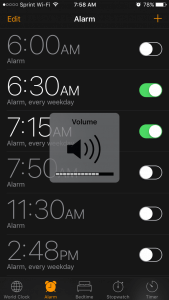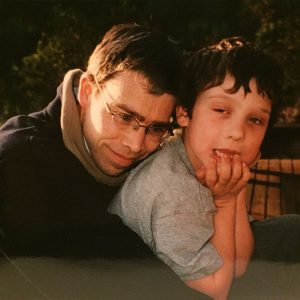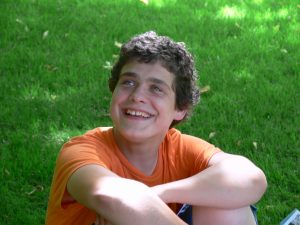 My alarm went off this morning in the middle of one of those dreams that makes you want to scream and cry. It was a mad/sad ABA dream.
My alarm went off this morning in the middle of one of those dreams that makes you want to scream and cry. It was a mad/sad ABA dream.
ABA (Applied Behavioral Analysis) is the Holy Grail for a parent whose child has autism. It is an intense behavioral therapy that effectively teaches children with autism how to learn specific skills we all pray our kids can acquire. I’m not talking college-prep; I’m talking wiping your bottom after using the toilet and washing your hands thoroughly.
In my dream several friends with children who have autism were discreetly talking about a weekend ABA camp their children were attending. An intensive that was touted as life changing. I overheard them, and realized that Zack had not been offered the chance to attend this invitation-only camp. As the dream progressed I realized the truth — he was beyond the age where the leaders of the camp thought ABA would help and their children were still young enough for it to make a difference.
I woke up with that feeling many of us recall from junior high school. The feeling we had when everyone in our usual social group was invited to a slumber party, and we were not. The event that signaled we were no longer part of the popular crowd.
For those with autism in the family, it is in a sense, the crowd with hope. The crowd with kids young enough to have ABA covered by their insurance.
I know specifically where this dream came from. More is explained below, in something I wrote last summer that I have been holding off on putting on this site because of what happened last November. Confused? Let me explain:
Last November I got a phone call I never thought I would get. It was an excellent ABA therapy clinic in Seattle calling to say they had room for my son to have the therapy. After nearly four years on their Wait List we had finally crept to the top. I couldn’t believe it. The woman asked if we were still interested, and I said, “YES!” She asked our availability. I said anytime day or night — oh, you want us to come in at 2 a.m., no problem! (Ok, she didn’t suggest that possibility, but I would have taken it if she had.)
We ended the conversation with her promising a phone call to set things up within the next month or two. When I pushed for an exact time-frame, she became vague, but promised we would be called.
Christmas came and went. No phone call. It was mid-January and still no phone call. So I called. No returned phone call. I called again. We needed to send in proof of his diagnosis. I did. We were promised a call. No phone call. I called again. Not available. I called again. Our paperwork was sent to the appropriate person for processing. I repeated the conversation I’d had with them in November. They didn’t remember my son and the promise. They just got a new client who must have taken that slot. I explained that he is going to be 21 soon and we are running out of time (see below for an explanation of that) and she repeated that we would be called when there is another opening, probably in the next couple of months.
This is where my mad/sad ABA dream came from. The problem is, it isn’t a dream.
Read on to learn more …
ABA Therapy
 We took Zack to a center for ABA when he was two-years-and-some-months old because he didn’t talk, barely responded to us, and didn’t play. On our first visit with the director, Zack laughed and tried to catch the bubbles that she blew, even verbalizing something close to the word “bubble” so she would continue. For parents whose child rarely interacted with anything beyond his own two hands and never uttered a word, this was magic. We were immediately convinced this therapy was the magic we were seeking.
We took Zack to a center for ABA when he was two-years-and-some-months old because he didn’t talk, barely responded to us, and didn’t play. On our first visit with the director, Zack laughed and tried to catch the bubbles that she blew, even verbalizing something close to the word “bubble” so she would continue. For parents whose child rarely interacted with anything beyond his own two hands and never uttered a word, this was magic. We were immediately convinced this therapy was the magic we were seeking.
It didn’t matter to me that six hours of therapy a week cost twice our monthly mortgage. This was going to “cure” my son and I was desperate.
It might have been the cure if the director had continued to work with our son. We’ll never know, because Zack was assigned to a young trainee instead. Still, I was sure I saw progress as the months went by. Jay, on the other hand, wasn’t so sure. The development we saw that year could have been attributed to Zack simply maturing.
I would do ABA again. I would have done more than we could afford. I understand why people take out second mortgages to try to help their child. I was ready to beg and borrow whatever I could for Zack.
In retrospect, my husband was right to convince me not to go into debt to continue. Our insurance covered only 10 percent of it, and the therapy did not help Zack enough to warrant its cost.
Government Promises for ABA Coverage
Thirteen years later, on January 1, 2013, Medicaid began to cover ABA therapy for individuals with autism through age 21. Zack was 17 at the time and I was shot through with the adrenalin of hope. I eagerly took the list of providers given by Seattle Children’s Autism Center and began imagining all the progress he could make and what it would mean for our family—less self-stimulating behavior, words to communicate instead of repeated babbling, wiping his bottom by himself. I could hardly wait to get started.
It didn’t take long for me to realize that nobody had room in their ABA practice to work with my son. Call after call led to dead ends. This practice only took private insurance, that practice only worked with kids up to age 16, and another practice could work with only three clients on Medicaid and those spots were full. I was repeatedly directed to put Zack on a waiting list.
Zack is now almost 21 years old and we have yet to reach the top of anyone’s list. Every time we go to the Autism Center they offer the names and numbers of providers to me again, and every time there is no reason for me to make the phone calls.
One problem with false hope is the anger it brings once you see through its facade. I gave up on Zack being magically transformed by the wonders of ABA therapy 15 years ago. To have that hope resurrected and then dashed feels like a cruel ruse some politician devised to make himself look good. What appeared to be a magnanimous decision on the part of the government lacked the resources for delivery, leaving many families, like ours, once again disappointed.
Despite my initial belief that ABA, or any other number of therapies, would prove to be the winning lottery ticket for Zack’s transformation, none of them were. Still, he has grown and developed far beyond where I thought he would, and he continues to surprise us with new abilities. I could remain trapped in the “woulda coulda shoulda” mindset, but it does no good. We did what we could do when Zack was young, and we continue to do what we can for him. When we let the maybes or might-have-beens go, we are able to embrace the Zack who is rather than longing for him to be different.

4 Comments. Leave new
I don’t know if you remember me, but I remember your family clearly. I remember babysitting Zack for a few years or months, I can’t distinguish as it was so long ago. I remember he liked the piano and we played with blocks and some kind of coloring book. He also loved to swing. Thank you for sharing your story and oh how important it is. I want to share this post with some of my own communities, because it needs to be heard. Blessings to your family.
Shanna — Are you Bill and Melodie’s daughter? If so, I remember you! If not, I need to see a photo to recall your name. Thank you for reading and sharing this post. There is so much need in our world, and those with disabilities (especially adults) are on that very long list. I appreciate the word getting out there.
Absolutely fearsome how this story played out of attempting time and time again to get into therapy. I had no idea it was so inaccessible. You have opened my eyes! I have a young friend who is with dedication and passion studying to be a therapist and teacher for children with autism (her sister also has autism), and I see why she was so deeply moved to take this path. They probably encountered similar challenges with her sister.
Yeah! We need more people going into this field! So glad to hear about your friend, Andrea.